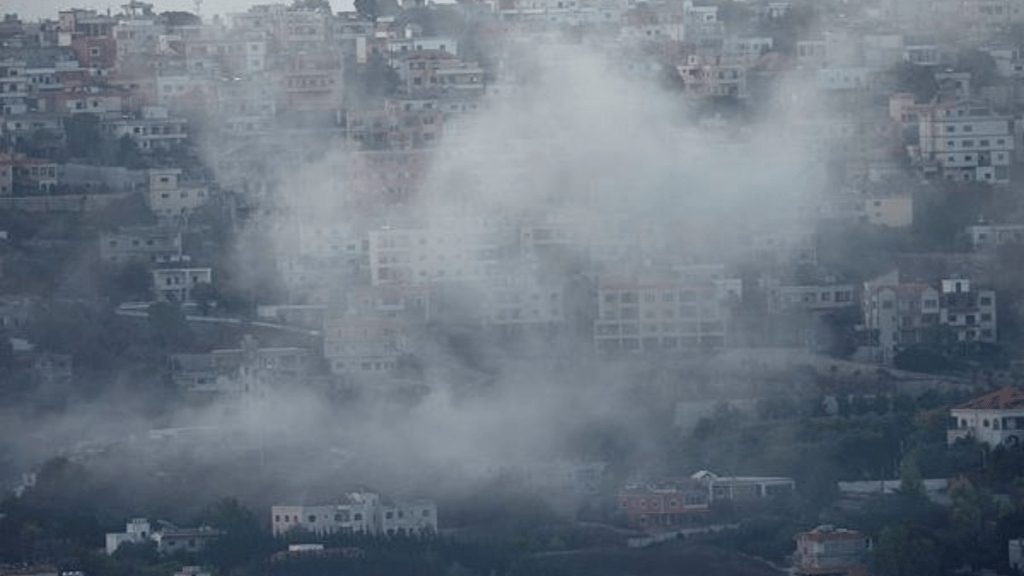Israeli strikes on Lebanon on Monday resulted in over 490 fatalities, including more than 90 women and children, according to Lebanese officials. This marked the deadliest assault since the 2006 conflict between Israel and Hezbollah. In response, the Israeli military has advised residents in southern and eastern Lebanon to evacuate ahead of its air campaign against Hezbollah.
Lebanon’s health ministry reported that the strikes resulted in 492 deaths, including 35 children and 58 women, with an additional 1,645 individuals injured. This high casualty rate comes as Lebanon grapples with the aftermath of a recent attack on communication infrastructure.
In the wake of the strikes, thousands of Lebanese residents evacuated from southern regions, creating significant traffic congestion on the main highway leading from the southern port city of Sidon to Beirut, the largest movement of people since 2006.
Israeli Prime Minister Benjamin Netanyahu, in a recorded statement, urged Lebanese civilians to heed the evacuation warnings, emphasising the importance of safety. “Please get out of harm’s way now. Once our operation is finished, you can come back safely to your homes,” he stated.
Rear Adm. Daniel Hagari, spokesman for the Israeli military, stated that the army will take necessary steps to drive Hezbollah away from the Israeli-Lebanese border. He claimed that the extensive airstrikes conducted on Monday had significantly damaged Hezbollah’s capabilities, although he did not specify a timeline for ongoing operations. Hagari indicated that Israel is ready to initiate a ground invasion of Lebanon if required. He said, “We are not looking for wars. We are looking to take down the threats.”
According to Hagari, Hezbollah has launched approximately 9,000 rockets and drones into Israel since October, with 250 of those fired on Monday alone. The Israeli military reported that its warplanes targeted 1,600 Hezbollah sites on the same day, destroying various weapons, including cruise missiles, long- and short-range rockets and attack drones. He added that many of these weapons were hidden in residential areas, presenting images of armaments allegedly concealed within private homes.
Israel estimates that Hezbollah possesses around 150,000 rockets and missiles, including guided and long-range projectiles capable of hitting any location in Israel.
Earlier in the evening, the Israeli military confirmed a targeted strike in Beirut, although specific details were not provided. Lebanon’s state-run National News Agency reported that three missiles struck the Beir al-Abed neighbourhood in southern Beirut.
Israel’s military chief, Lt. Gen. Herzi Halevi, announced that the Israeli forces are preparing for the next phases of their operations against Hezbollah. He described airstrikes as proactive, aimed at dismantling Hezbollah infrastructure developed over the last two decades. Halevi emphasised that the objective is to enable displaced Israelis to return safely to their homes in northern Israel.
US’ concern over airstrike
A spokesperson for President Joe Biden expressed concern about the escalating situation between Israel and Hezbollah in Lebanon, highlighting the importance of achieving a cease-fire between Israel and Gaza as a crucial step toward easing regional tensions. White House Press Secretary Karine Jean-Pierre stated, “It’s in everyone’s interest to resolve it quickly and diplomatically,” while accompanying Biden to New York for his upcoming address to the U.N. General Assembly.
A State Department official, speaking on the condition of anonymity to discuss ongoing diplomatic efforts, mentioned that the U.S. and several other nations are eager to provide an off-ramp for both Israel and Hezbollah to de-escalate tensions and avoid a full-scale conflict. The official noted that the U.S. has concrete ideas for restoring calm, which will be shared with allies and partners at this week’s U.N. meetings. However, they refrained from detailing these ideas, stating that they have yet to undergo a stress test for viability. In the meantime, U.N. peacekeepers stationed in southern Lebanon near the Israeli border have halted their patrols and are remaining in their bases due to the intense exchange of fire, according to a U.N. spokesman.
Netanyahu asks residents to flee
Residents in southern Lebanon on Monday received text messages warning, “If you are in a building housing weapons for Hezbollah, move away from the village until further notice,” according to local media reports.
Lebanon’s information minister, Ziad Makary, stated that his office in Beirut also received a recorded message advising people to evacuate their buildings. He described this as part of a psychological war waged by Israel and urged citizens not to give the matter more attention than it deserves.
Communities on both sides of the border have largely emptied due to ongoing exchanges of fire. Israel has accused Hezbollah of converting entire neighbourhoods in southern Lebanon into militant strongholds, equipped with concealed rocket launchers and other military infrastructure. This situation raises the likelihood of intensified Israeli airstrikes, even without a ground invasion.
(with inputs from AP)


